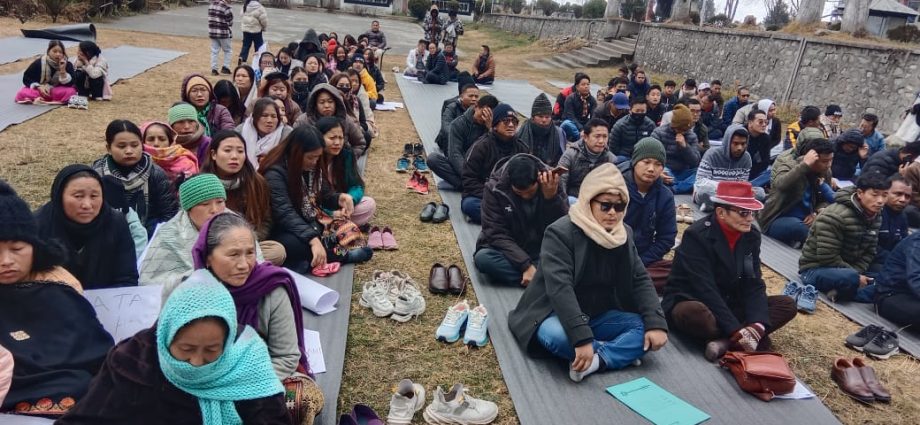By Matters India Reporter
Itanagar, Feb 19, 2025: Thousands of Christians in Arunachal Pradesh are protesting the northeastern Indian state’s move to implement a 1978 law that bans religious conversions.
They are led by the Arunachal Christian Forum (ACF), an ecumenical forum, that organized an eight-hour hunger strike on February 17 in the state capital of Itanagar.
Forum president Tarh Miri said the Arunachal Pradesh Freedom of Religion Act (APFRA), 1978, violates the freedom of accepting faith and religious belief.
“We oppose this Act. Anti-conversion law is enforced in 11 states. This is only against Christianity,” he told media persons.
Forum secretary general James Techi Tara said the enforcement of the law would create hatred among people.
The protesters, including some members of the state legislature, held posters that read “We demand the repeal of APFRA,” “Do not turn us against one another,” “there is no honour in enforcing APFRA.”
The protest was organized as the state government plans to implement the law in March after the Gauhati High Court asked it to finalize the act’s draft rules within six months from September 2024.
In 2018, Chief Minister Pema Khandu publicly announced that his government might repeal the anticonversion law, stating that it “could undermine secularism and is probably targeted towards Christians.” He acknowledged concerns that it could be misused by authorities and promised to bring it before the assembly for repeal.
However, after backlash from Hindutva groups and pressure from the BJP, Khandu reversed his stance. Hindutva organizations, such as the Rashtriya Swayamsevak Sangh (RSS) and Vivekananda Kendra, began establishing Hindu schools, promoting cultural nationalism, and reviving indigenous tribal faiths in Arunachal Pradesh to counter Christianity.
Christians fear revival of repression. Between 1968 and 1974, police burned churches, looted homes, and attacked Christian families. In 1974, authorities torched 47 churches in a single region. Some Christians faced executions, hangings, or beatings. Others fled to the forests and survived on roots and leaves.
“Changing faith is a person’s choice. Forced conversion is restricted in the Indian Constitution. We want nothing less than the repeal of the Act,” Tara asserted.
He challenged those supporting the law to show one instance where a complaint was lodged for forced conversion in the state.
Christianity in Arunachal Pradesh grew from less than 1 percent in 1971 to more than 4 percent in 1981. To combat this growing trend, the state established the law that prohibited conversions or attempts to convert by force, inducement, or fraudulent means.
It also mandated government scrutiny of religious conversions. Under the law, authorities could send anyone guilty of conversion to prison for two years or apply a fine of up to 10,000 Indian rupees.
Chief Minister Pema Khandu said the rules being framed were not against any religion.
“The government has been asked to frame the rules to give some more protection to indigenous (faiths),” Khandu said.
The Christian forum accused the chief minister of having double standard.
“We don’t entertain his statement. In 2018, he himself had announced that he will repeal this draconian law. But in 2024, he announced that it will be implemented. This is his double-standard,” Miri said.
Khandu had said the anticonversion law could undermine secularism and was probably targeted towards Christians.
However, Khandu reversed his stance apparently under pressure from rightwing groups.
Arunachal Pradesh was the third state to introduce the anticonversion law. Orissa was the first state to bring such a law in 1967, followed by Madhya Pradesh in 1968.











If anyone wants to convert to Hinduism, will the Anticonversion law apply?